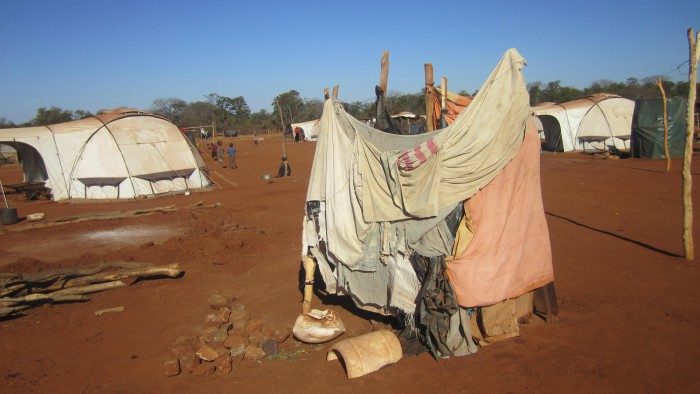


PROVINCIAL Affairs Minister Kudakwashe Bhasikiti faces a backlash from his colleagues in government after he gave a flattering account of the situation at Chingwizi Transit Camp at a recent ZANU-PF Politburo meeting that is totally removed from the reality on the ground. Bhasikiti told a Politburo meeting chaired by President Robert Mugabe that swift interventions by relief agencies had arrested a precarious food situation at Chingwizi camp.
State media quoted ZANU-PF’s national spokesperson Rugare Gumbo as saying Bhasikiti had told the meeting that food provision at the camp had improved following the intervention of the World Health Organisation. But a visit to the camp by the Financial Gazette established that instead urgent global intervention is required to prevent starvation after food stocks depleted to dangerous levels in the past week.
Scores of the flood victims said they were grappling with the agony of having to watch children’s conditions deteriorate due to malnutrition. Severely malnourished children have been hit by chronic diseases like dysentery and diarrhoea. The entire 20 000 Chingwizi community is facing starvation. Representatives of Chingwizi residents, who feel “dumped and neglected by the State” said they would take the issue up with Bhasikiti whom they feel misled members of the ruling party’s highest decision-making body outside congress — the Politburo.
“We are sending a delegation to see the Local Government Minister, Ignatius Chombo, over that issue,” Mike Mudyanembwa, the spokesman of the Chingwizi residents, told the Financial Gazette. The 20 000 Tokwe-Murkosi flood survivors have endured a gruelling life since February this year when they were moved to the camp. They are having to contend with shortages of food, lack of adequate water, diarrhoea outbreaks, the hostile winter, as well as raging storms that frequently ripped their makeshift shelter apart.
Although government has provided land for Chingwizi residents to be relocated from the overcrowded transit camp, only about 600 of the 3 000 families have agreed to the move with the rest refusing to shift before they have been given their compensation. Government, which has since promised to compensate these displaced villagers, has not yet managed to put together the required funds.
The people are bitter. They were promised a combined US$9 million, which translates to about US$3 000 per family, in compensation before they are moved to permanent plots. Five months on, government has not delivered. Failure by government to give the compensation has incensed the villagers who feel government is not demonstrating sufficient concern for them. This has been exacerbated by government’s reneging on promises to give them bigger pieces of land.
While the villagers were initially promised four hectares per family, this hectarage has since been revised downwards to one, which they are disputing. “We last received food last month from CARE,” said 35 year old Loveness Machipisa, a mother of seven who now spends up to 12 hours every day working under difficult conditions in neighbouring farms for a US$2 per day wage.
Breast-feeding her wide-eyed baby, with several of her younger children leaning on her for support, Machipisa chronicled a sad tale of strife torn villagers whose confidence in their government has ebbed. Across the chaotic dungeons that they now call homes, the people are praying for a miracle to save them. “We have no food and no water,” she mourned. “It is so hard going through this.”
“But we have no choice. We were successful farmers in Tokwe-Mukosi Ranch, who did not crave for handouts or State benevolence. Yet we have been reduced to beggars; I think we are all going to die of starvation.” Relief agencies estimate that 156 tonnes of maize meal are required every month to feed the camp.
But donor fatigue has crept in. A recent report by UN Office for the Coordination of Humanitarian Affairs (OCHA) indicated that as of April 22, funding was “urgently required to address a glaring 132 tonnes shortfall of cereal”. A UN Children’s Fund (UNICEF) official said recently that the agency alone required US$2 million to bankroll a string of interventions at Chingwizi, which sits on the fringes of the expansive Nuanetsi Ranch near Chiredzi.
To date UNICEF has only raised about US$233 000. OCHA described conditions at Chingwizi as “overcrowded and unhygienic”. Feeling dumped and neglected by government in the secluded barren and unproductive forests after torrential rains triggered raging waves and terrifying storms that crawled through what was home to 60 000 peasant farmers in February, Chingwizi residents say government should honour its promise.
They raced to higher ground as charging waters swamped their homes, crops, livestock, huts, clay pots, carts, granaries and the graves of their ancestors. This dreadful experience was not of their making, but the result of poor State planning. Rehabilitative work on the Tokwe-Murkosi dam, which could have prevented disasters such as flooding, had been on the table for over 20 years, but administrators waited until the sudden floods took them by surprise.
Last month, villagers at the camp ordered 10 ministers dispatched to sweet-talk them into relocating before compensation, to back off. In a country where citizens are wont to stage protest, the villagers took the unprecedented move of walking out of a meeting where they refused to chant ZANU PF slogans, but so far desired end result has not been achieved.
Increasing numbers of the vulnerable residents, including breast feeding and pregnant women, children, widows, the physically handicapped; HIV AIDS patients and elderly citizens are demanding just treatment. “If I have my home with my cows I can milk them and I can grow food crops. I will be fine,” said a victim. The ZANU PF politburo meetings make crucial decisions which are funnelled into government programmes. Manipulations of issues at the politburo will frustrate efforts by the international community to intervene and arrest the grave humanitarian crisis, experts have said.
newsdesk@fingaz.co.zw